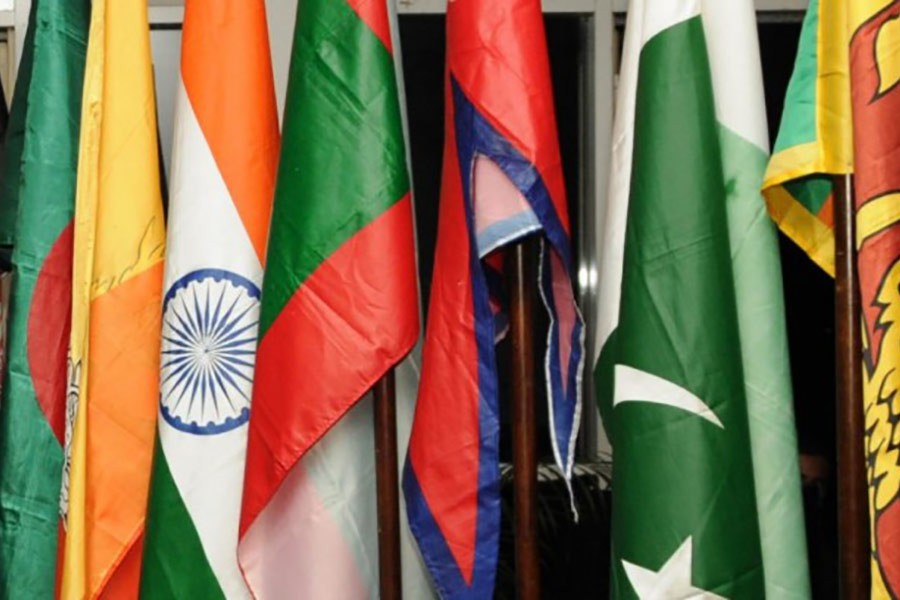
Published :
Updated :

The South Asian Association for Regional Cooperation (SAARC) was designed to accelerate economic progress and social development in member-states. In the consumer market, SAARC is the largest regional organisation in terms of population. It was formed on December 08, 1985 by Bangladesh, Bhutan, Maldives, Nepal, Pakistan, India, and Sri Lanka. Afghanistan became a Member State on April 03, 2007 following India's recommendation. SAARC has nine observer members including the EU, China, Japan, and the USA.
Over the years, intra-regional trade has undergone a downward slide in this region. In 1948, intra-regional trade amongst the South Asian countries was at 19 per cent, which has decreased to 5.0 per cent. SAARC performance in intra-regional trade is very poor in comparison to other trade blocs around the world (FICCI study report in 2014). Cultural, political and religious differences among countries in the region was attributed for this poor performance. Individual countries are doing an excellent job in exporting to other parts of the world but performing miserably in intra-regional trade.
In 2008, India's trade within SAARC was only 0.8 per cent of its total imports and 5.0 per cent of total exports. In contrast, Nepal's was around 73.9 per cent of total imports and 59.6 per cent of total exports.
India is the strongest economy in South Asia and can take the initiative to build trust amongst SAARC nations. It can show openness and explore various arrangements to alleviate the security and domination concerns of its neighbouring countries. This can be done through discussions at the ministerial level; signing agreements and pacts; forming informal civil society organisations; and developing people-to-people contacts. Such efforts would send a strong message across SAARC to develop a closer and congenial relationship between the regional countries. India is in a position to initiate a healthy partnership between members by ignoring or minimising previous misunderstandings and restoring faith in SAARC unity.
Moreover, there are many reasons behind the caginess of SAARC countries. Historically, Pakistan and Bangladesh have difficult border issues with India. Moreover, there is a growing concern about cross-border infiltration by terrorists and illegal immigration. All these issues generate a climate of distrust between these nations. These countries have a protective attitude towards their own economies. As a result, the growth among the South Asian countries has remained exclusive. In case of India, this has generated more suspicion.
No country benefits from this restrictive attitude towards each other, as regional integration is necessary for growth. For example, all of India's neighbouring countries need to benefit from its huge and growing economy. India needs better relations with its neighbours to create a friendly environment for sustainable development and to advance its foreign policy ambitions beyond the region. This is possible if India embraces this region and builds a framework of cooperation that increases contacts and promotes a sense of prosperity in the South Asian region.
Regional cooperation can play a critical and decisive role in maximising individual experiences. The SAARC Charter includes elements like regional harmony, peace, and prosperity. India should take the lead in building mutual confidence and maintaining comfort levels. The former Prime Minister of India Inder Kumar Gujral had said that there was no zero-sum game in South Asia and it is in the best interest of all to move towards mutual prosperity. This 'Gujral Doctrine' was welcomed by all parties. Given its geographic position and the size of its economy, India can play a vital role in regional integration without sacrificing its own basic interests.
India shares land and maritime borders with all SAARC counties except one. As a result, India's role in the SAARC region is of paramount importance. India should not perceive its neighbours as being envious of its growing economic and political clout. From India's perspective, prosperity lies in regional cooperation rather than in isolation. As a result, India should take active initiative to engage other countries and undertake confidence-building measures.
Sustainable economic development and prosperity of this region is possible by prioritising intra-regional trade instead of merely the Western market. A large and vibrant regional Asian market can be significant, because of demographic shifts and growth in global demand for Asian products. These countries can adopt a long-term strategic approach to build an Asian market.
With 75 per cent of the total, India is the largest gross domestic product (GDP) contributor in the South Asia region. Pakistan contributes 10 per cent, Bangladesh 8.0 per cent, and Sri Lanka 3.0 per cent. Other SAARC members have negligible GDP contributions (World Bank 2012). These figures demonstrate India's position and its obligation to take the initiative for greater trade integration in this region. India occupies 73 per cent of SAARC's regional territory, has 75 per cent of the regional GDP, accounts for 78 per cent of regional exports and 60 per cent of regional imports (World Bank 2012). Therefore, India is in a position to advance the trade agenda and take initiatives for regional integration. The import and export flow of goods to and from India with neighbouring countries show that Nepal receives 55 per cent, Bangladesh 20 per cent, and Sri Lanka 15 per cent of their total imports from India, whereas exports by these countries to India is quite small in comparison to India.
Despite India's superior position within the region, the SAFTA countries do not accept India as their leader. India's dominant position within the region creates distrust and suspicion among members. In this environment, countries cannot work together towards regional trade integration. [The article has been abridged.]
Dr. Syed Neyamul PhD is a Joint Commissioner of Customs & VAT at the National Board of Revenue (NBR), Dhaka. Opinion expressed in the article is of the writer's own.
drneyam@gmail.com


 For all latest news, follow The Financial Express Google News channel.
For all latest news, follow The Financial Express Google News channel.